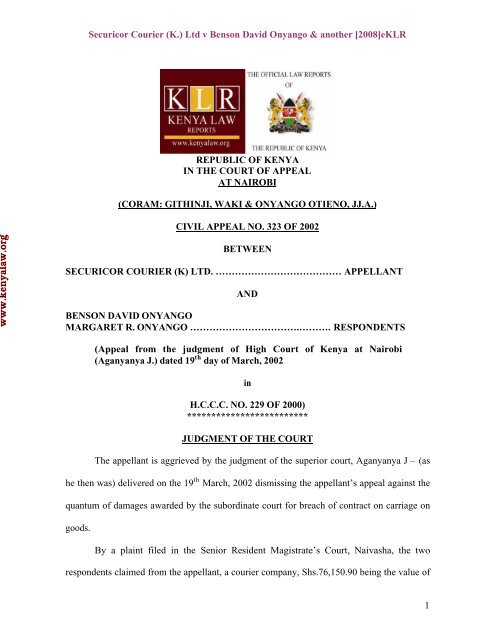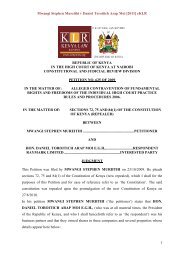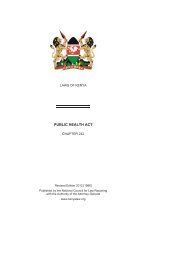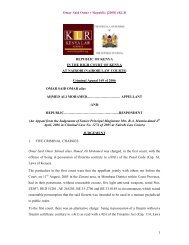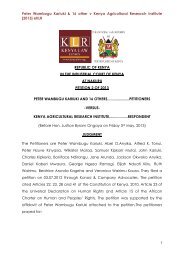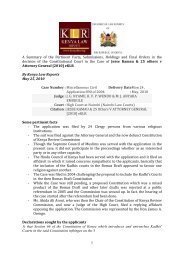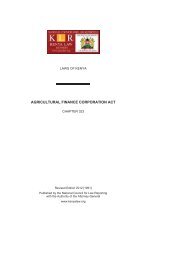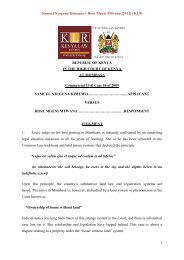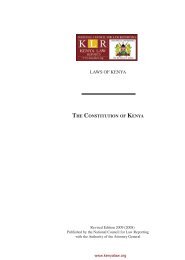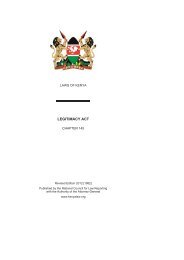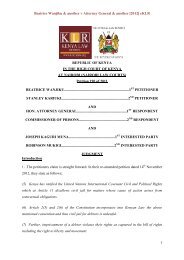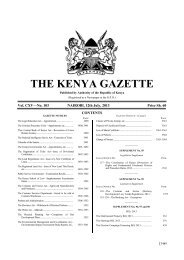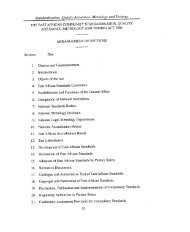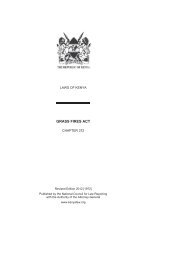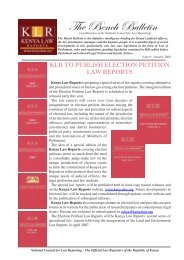Download Case - Kenya Law Reports
Download Case - Kenya Law Reports
Download Case - Kenya Law Reports
Create successful ePaper yourself
Turn your PDF publications into a flip-book with our unique Google optimized e-Paper software.
Securicor Courier (K.) Ltd v Benson David Onyango & another [2008]eKLR<br />
REPUBLIC OF KENYA<br />
IN THE COURT OF APPEAL<br />
AT NAIROBI<br />
(CORAM: GITHINJI, WAKI & ONYANGO OTIENO, JJ.A.)<br />
CIVIL APPEAL NO. 323 OF 2002<br />
www.kenyalaw.org<br />
BETWEEN<br />
SECURICOR COURIER (K) LTD. ………………………………… APPELLANT<br />
AND<br />
BENSON DAVID ONYANGO<br />
MARGARET R. ONYANGO …………………………….………. RESPONDENTS<br />
(Appeal from the judgment of High Court of <strong>Kenya</strong> at Nairobi<br />
(Aganyanya J.) dated 19 th day of March, 2002<br />
in<br />
H.C.C.C. NO. 229 OF 2000)<br />
*************************<br />
JUDGMENT OF THE COURT<br />
The appellant is aggrieved by the judgment of the superior court, Aganyanya J – (as<br />
he then was) delivered on the 19 th March, 2002 dismissing the appellant’s appeal against the<br />
quantum of damages awarded by the subordinate court for breach of contract on carriage on<br />
goods.<br />
By a plaint filed in the Senior Resident Magistrate’s Court, Naivasha, the two<br />
respondents claimed from the appellant, a courier company, Shs.76,150.90 being the value of<br />
1
Securicor Courier (K.) Ltd v Benson David Onyango & another [2008]eKLR<br />
two parcels, a Sony Television and a Micro-component (JVC system) which the appellant<br />
allegedly in breach of contract failed to deliver to the rightful consignee. The respondents in<br />
addition claimed general damages for breach of contract.<br />
The essential facts are not in dispute. On 13 th July, 1995, the 1 st respondent, a<br />
military man, took two parcels to the offices of the appellant, at Thika for delivery to his<br />
wife, the 2 nd respondent at Naivasha. One of the parcels contained a Sony Television and the<br />
second parcel a JVC system. This was not known to the appellant.<br />
The appellant’s clerk weighed the two parcels. Their total weight was 34 kilograms.<br />
www.kenyalaw.org<br />
The 1 st respondent was charged Shs.980 for the service. He signed the Consignment Sheet<br />
which contained Conditions of the Service overleaf. The 1 st appellant produced the client’s<br />
copy of the Consignment Sheet as an exhibit at the trial. The goods were received at<br />
appellant’s Naivasha office by Julius Mwangi Mylalya (Julius). Thereafter Julius received a<br />
telephone call from a man calling himself Benson Onyango from Naivasha who told him that<br />
he would send one John Abuto to collect the goods. The said Benson Onyango gave the<br />
Identity Card No. of John Abuto and further informed Julius that John Abuto would arrive in<br />
a motor vehicle Reg. No. KTD 823. Shortly thereafter, a man who identified himself as John<br />
Abuto arrived at the offices of the appellant at Naivasha. He had the parcel numbers and the<br />
goods were released to him after signing for them. The 1 st respondent went to the Naivasha<br />
offices of the appellant about half an hour later to collect the goods. He was informed that<br />
the parcels had already been collected by John Abuto. The 1 st appellant denied authorizing<br />
John Abuto to collect the goods. The appellant reported the incident to the police. After<br />
sometime, John Abuto was arrested and Julius went to an Army Barrack at Thika and<br />
identified him. The result of the police investigations were not disclosed. On those facts, the<br />
2
Securicor Courier (K.) Ltd v Benson David Onyango & another [2008]eKLR<br />
1 st respondent pleaded that the appellant was negligent and had breached the contract of<br />
carriage. The appellant denied negligence or breach of contract and further pleaded that the<br />
contract limited the appellant’s liability for loss or damage to goods at Shs.1,000/=.<br />
The trial magistrate in a terse judgment held the appellant liable for breach of contract<br />
holding in part:<br />
www.kenyalaw.org<br />
“This case relates to exclusion clauses. The defendants defence is pegged<br />
on these clauses which are found on the conditions of service in the<br />
consignment sheet number exhibit 3. I have perused the said clauses and I<br />
find that they are not prominently exhibited to customers except those<br />
insuring the goods. This to my mind is an unconscionable contract. I<br />
further find that the defendant acted in unprofessional way by changing the<br />
terms of contract through acting on so called information by telephone.<br />
Such was not envisaged in the contract. Apart from breach of contract, I<br />
find that the defendant was negligent in identifying as a third party a<br />
consignee”.<br />
The subordinate court entered judgment for the respondents for Shs.25,000/= being<br />
general damages for breach of contract and Shs.76,150.90 being special damages (value of<br />
the goods).<br />
The appellant appealed to the superior court against the quantum of damages only<br />
contending that the subordinate court erred in awarding more than Shs.1,000/= being the<br />
maximum liability under the contract and in awarding general damages for breach of<br />
contract. The superior court dismissed the appeal in its entirety. Since this appeal raises an<br />
important legal issue concerning validity of exemption clauses in various contracts it is<br />
important to show in full how the superior court resolved the legal issue. The superior court<br />
reasoned, thus:<br />
“Counsel for the appellant relies on paragraph 2 (b) of the conditions<br />
provided overleaf the receipt issued to the customer where a claim for loss of<br />
the items conveyed will not exceed a maximum of Shs.1,000/= for every item<br />
or Kshs.20,000/= in any one year. In the first place this provision is at the<br />
back of the receipt to which the client is referred at the front thereof. Look<br />
3
Securicor Courier (K.) Ltd v Benson David Onyango & another [2008]eKLR<br />
at this situation where a customer goes to the offices of the courier company<br />
with parcels for delivery and at the counter he finds a counter clerk, most of<br />
whom, if not all, are not conversant with warning to customers over the<br />
conditions of service. Their role actually is to receive the package and<br />
collect the charges; here the charges were Kshs.980/=.<br />
www.kenyalaw.org<br />
This (sic) must have been very valuable items for which a sum of<br />
Kshs.980/= was paid. These parcel (sic) had excess weight of 29 kg and the<br />
clerk did not query this but accepted to convey it and charged Kshs.980/=.<br />
The clients may or may not be literate or even if they are literate, where is<br />
the time to first read those conditions before formerly handing over the<br />
package at the counter and paying the charges for conveyance? If they are<br />
not literate, are sort of clerks normally at the counters of these courier<br />
companies, the type to know of these conditions and to refer clients to them<br />
before offering the service? I feel not, and when the learned magistrate said<br />
the conditions were unconscionable, he had in mind these observations I<br />
have stated above.<br />
In any case the clerk who received the parcels at Thika office of the<br />
appellant did not appear to confirm that he drew the attention of PW1 (1 st<br />
respondent) to paragraphs 2(b) of the conditions of service before accepting<br />
to convey them to their Naivasha office for delivery to the rightful<br />
consignee, thereof.<br />
And if it was PW1 who had sent these items from Thika to Naivasha why<br />
accept a telephone call from him at Naivasha to release the same to one<br />
John or Joals Abuto when the actual consignee was Margaret R. Onyango?<br />
This was the height of negligence on the part of the appellant at its<br />
Naivasha office and on my part I would say the respondents were not bound<br />
by the contract not drawn to their attention and this was a suitable case for<br />
the magistrate to brush aside or ignore this contract and award the<br />
respondent general damages for negligence, apart from the special damages<br />
as these were specifically proved …………”.<br />
This appeal is against those findings.<br />
Although the 1 st respondent stated in his evidence at the trial that the agreement he<br />
was given did not bear conditions, he admitted that he was issued with the forms which he<br />
signed. Indeed, he produced as exhibit at the trial, the client’s copy of the Consignment<br />
Sheet which has the Conditions of Service overleaf. The two courts below seem to have<br />
4
Securicor Courier (K.) Ltd v Benson David Onyango & another [2008]eKLR<br />
accepted the Consignment Sheet as embodying the contract as they proceeded to construe<br />
clause 2 (b) therein.<br />
The Consignment Sheet has two pages, the front and the back. The last part of the<br />
first page is important. It reads:<br />
“Special Remarks:<br />
THE CLIENTS ATTENTION IS DRAWN TO THE CONDITIONS OF SERVICE OVERLEAF.<br />
CUSTOMERS ARE ADVICED TO SELF INSURE ALL ITEMS OF VALUE BEING SENT<br />
THROUGH THE COURIER SERVICE.<br />
www.kenyalaw.org<br />
NOTE: CASH IS NOT CARRIED ON THE COURIER SERVICE AND THE COMPANY WILL NOT ACCEPT<br />
ANY LIABILITY FOR ANY LOSS OF CASH IF CARRIED ON THIS SERVICE.<br />
Signature of Client (or authorized signature) ____(Sgd.)_______________ Date 13/7/95<br />
Name in capitals and designation BENSON D. ONYANGO<br />
Confirmed, Checked and Received ____(Sgd.)______________ Signature and Date 13/7/95<br />
CSPA (9/92)<br />
CONSIGNMENT SHEET NUMBER”.<br />
alia, thus:<br />
Clause 2 of the Condition of Service which is printed in small letters provides, inter<br />
“2. In consideration of the payment hereinafter agreed to be made to the<br />
company by the client, and by way of limitation of the liability of the<br />
Company, the company shall (subject as hereafter mentioned during<br />
the continuance of the contract<br />
(a) Carry out (subject to the provisions of the Contract) with proper<br />
care the services described in the schedule overleaf.<br />
(b) Subject to provisions of clauses 3 hereof indemnify the Client<br />
against any loss or damage resulting from loss or damage to a<br />
consignment occurring during any period of the Company’s<br />
responsibility and which was caused solely by negligence on the<br />
part of the servants or agents of the Company acting in the<br />
5
Securicor Courier (K.) Ltd v Benson David Onyango & another [2008]eKLR<br />
course of their employment provided that this indemnity shall<br />
apply only to loss or damage represented by or consisting of the<br />
cost of replacing such consignment and (in the case of Data) of<br />
hiring of any additional computer time necessitated thereby with<br />
an overall maximum sum of <strong>Kenya</strong> Shillings One Thousand<br />
(Kshs.1,000/=) in respect of any one claim and subject further to<br />
a maximum sum of <strong>Kenya</strong> Shillings Twenty thousand<br />
(Kshs.20,000/=) in respect of all such loss or damage occurring<br />
in any consecutive period of 12 months. This indemnity shall<br />
not, nor shall any liability of the company its servants or agents<br />
to the client, on any ground or for any cause whatever or under<br />
any circumstances extend to any consequential loss or to any loss<br />
or damage other than the cost of replacement ……”.<br />
www.kenyalaw.org<br />
Clause 3 (d) of the Conditions of Service further provides that if the company carries<br />
out more than one service for a client on any one day the total liability for the company<br />
during that day shall not exceed Shs.10,000/=.<br />
The 1 st respondent agrees that he signed the first page of the Consignment Sheet as<br />
shown.<br />
In this case, the appellant had conceded liability and is not therefore relying on any<br />
exemption clause in the contract to exclude its liability for breach of contract or negligence.<br />
However, the appellant is relying on clause 2, an exemption clause, which limits its liability<br />
to the sums specified in that clause. It is not therefore necessary to examine in detail the law<br />
on the efficacy of various forms of exemption clauses which exclude liability altogether. The<br />
history of the English courts’ approach to the contractual clauses excluding or limiting<br />
liability was comprehensively traced by Lord Denning M.R. in George Mitchell<br />
(Chesterhall) Ltd. v. Finney Lock Seeds Ltd. [1983] 1 All E.R. 108 from page 111 – 117.<br />
The history shows that for some years in the development of the common law, the<br />
English court introduced the doctrine of “fundamental breach” of a contract to obviate<br />
injustice which may be caused by an exemption clause in certain cases. Under that principle,<br />
6
Securicor Courier (K.) Ltd v Benson David Onyango & another [2008]eKLR<br />
if a party with superior bargaining power, especially in standard form contracts, was guilty of<br />
breach of the contract which went to the root of the contract, he would not be permitted to<br />
rely on the exemption clause in the contract which absolved him from liability entirely. That<br />
principle has now been reversed by House of Lords and in some cases by Legislative<br />
intervention. In Photo Production Ltd. vs. Securicor Transport Ltd. [1980] 1 All E.R. 556,<br />
the House of Lords discarded the doctrine of fundamental breach holding that there was no<br />
rule of law by which an exemption clause in a contract could be eliminated from<br />
consideration of the parties’ position when there was a breach of contract, whether<br />
www.kenyalaw.org<br />
fundamental or not or by which such a clause could be deprived of effect regardless of the<br />
terms of the contract.<br />
The House of Lords reiterated that common law approach as enunciated in Photo<br />
Products Ltd. (supra) to exemption clauses in George Mitchell (Chesterhall) Ltd. vs. Finney<br />
Seeds Ltd. [1983] 2 All E.R. 737. However, in that case, the House of Lords applied the test<br />
of what is fair or reasonable to the exemption clause in issue which test is provided in the<br />
English Sale of Goods Act, 1979.<br />
The English Parliament has regulated the application of exemption clauses in one way<br />
or another in various statutes e.g. Supply of Goods (Implied Terms) Act, 1973; The Unfair<br />
Contract Terms Act 1977; The Sale of Goods Act 1979 and in Consumer Contracts<br />
Regulations, 1994.<br />
Thus under English law the standard form contracts containing exemption clauses are<br />
in some cases governed by common law and in others by statute.<br />
7
Securicor Courier (K.) Ltd v Benson David Onyango & another [2008]eKLR<br />
In our jurisdiction however, such contracts are purely governed by the common law.<br />
It seems that the current law governing the exemption clauses is as expressed by the House of<br />
Lords in Photo Production Ltd. (supra) and in George Mitchell (Chesterhall) Ltd. (supra).<br />
The House of Lords has however, held that a limitation clause was not subject to the<br />
very strict principles of construction applicable to clauses of complete exclusion of liability<br />
or of indemnity (see Ailsa Craig Fishing Co. Ltd. vs. Malvern Fishing Co. Ltd. [1983] 1 All<br />
E.R. 101 which was applied in George Mitchell (Chesterhall) Ltd. vs. Finney Lock Seeds<br />
Ltd. (supra).<br />
www.kenyalaw.org<br />
In Ailsa Craig, Lord Wilberforce said in part at page 102 -103 j:<br />
“Whether a condition limiting liability is effective or not is a question of<br />
construction of that condition in the context of the contract as a whole. If it<br />
is to exclude liability for negligence, it must be most clearly stated and<br />
unambiguously expressed, and, in such a contract as this, must be<br />
construed contra proferentem. …… Clauses of limitation are not regarded<br />
by the courts with the same hostility as clauses of exclusion; this is because<br />
they must be related to other contractual terms, in particular to the risks to<br />
which the defending party may be exposed, the remuneration which he<br />
receives and possibly also the opportunity of the other to insure”.<br />
In the same case, Lord Fraser of Tullybelton said at page 105 h – j:<br />
“There are later authorities which lay down very strict principles to be<br />
applied when considering the effect of clauses of exclusion or of indemnity.<br />
…………………………….<br />
………………………………………………………………………………….<br />
In my opinion, these principles are not applicable in their full rigour when<br />
considering the effect of conditions merely limiting liability. Such<br />
limitations will of course be read contra proferentem and must be clearly<br />
expressed, but there is no reason why they should be judged by the specially<br />
exacting standards which are applied to exclusion and indemnity clauses.<br />
The reason for imposing such standards on these conditions is the inherent<br />
improbability that the other party to a contract including such a condition<br />
intended to release the proferens from liability that would otherwise fall on<br />
him. But there is no such high degree of improbability that he would agree<br />
to a limitation of the liability of the proferens, especially when ……… the<br />
potential losses that might be caused by the negligence of the proferens or<br />
8
Securicor Courier (K.) Ltd v Benson David Onyango & another [2008]eKLR<br />
its servants are so great in proportion to the sums that can reasonably be<br />
charged for the services contracted for. It is enough in the present case,<br />
that the condition must be clear and unambiguous”.<br />
Turning to the present appeal, it is apparent that the trial magistrate did not make any<br />
attempt to construe clause 2 (b) of the Conditions of Service. The trial court merely said that<br />
the clause was unconscionable without assigning any reasons. The superior court failed to<br />
give effect to the limitation clause because it was not satisfied that the clause was drawn to<br />
the attention of the 1 st respondent. The superior court however, used general expressions<br />
which might be understood to mean that the exemption clauses in standard form contracts,<br />
www.kenyalaw.org<br />
particularly those relating to courier companies, are generally unenforceable either because,<br />
the clauses are in small print at the back of the consignment sheet; or the client though<br />
literate can never have time to read the clauses or that counter clerks employed by courier<br />
companies are not qualified to advise illiterate clients of the existence and tenor of such<br />
clauses.<br />
The fact that the exemption clause is in small print and at the back page of a contract<br />
is not a valid ground for rejecting such a clause. Moreover, the findings of the superior court<br />
that literate persons would never have time to read such clauses and that courier companies<br />
do not have competent counter clerks were mere speculation as they were not based on any<br />
evidence.<br />
That notwithstanding, the statement of the law by the superior court to the effect that<br />
a party cannot be bound by a contract which has not been brought to his attention is no doubt<br />
correct. Indeed, where clauses incorporated into a contract contain particularly onerous or<br />
unusual condition, the party seeking to enforce that condition has to show that he did what<br />
was reasonably sufficient to bring it to the notice of the other party, otherwise, the condition<br />
9
Securicor Courier (K.) Ltd v Benson David Onyango & another [2008]eKLR<br />
does not become part of the contract. (See Thornton vs. Shoe Lane Parking Ltd. [1971] 2<br />
Q.B. 163; Interfoto Picture Library Ltd vs. Stiletto Visual Programmes Ltd. [1989] 1 Q.B.<br />
433).<br />
An exemption clause can be incorporated in a contract by, inter alia, signature or<br />
notice. Generally speaking, if a party signs contractual documents containing an exemption<br />
clause, he is bound by it even though he has not read the terms, unless he signed the<br />
documents through fraud or misrepresentation. In L’Estrange vs. F. Graucob Ltd. [1934] 2<br />
K.B. 394; Scrutton L.J. said at page 403:<br />
www.kenyalaw.org<br />
“When a document containing contractual terms is signed, then, in the<br />
absence of fraud, or, I will add, misrepresentation, the party signing it is<br />
bound, and it is wholly immaterial whether he has read the document or<br />
not”.<br />
That case was applied in Curtis vs. Chemical Cleaning & Dyeing Co. Ltd. [1951] 1<br />
All E.R. 631 where Denning L.J. said at page 633 H:<br />
“If a party affected signs a written document, knowing it to be a contract<br />
which governs the relations between him and the other party, his signature<br />
is irrefragable evidence of his assent to the whole contract, including the<br />
exemption clauses, unless the signature is shown to be obtained by fraud or<br />
misrepresentations”.<br />
In this case, the 1 st respondent admits that he signed the Consignment Sheet which<br />
forms the contract between the parties. He also retained the client’s copy of the Consignment<br />
Sheet which he relied on as evidence of the contract of carriage and which he also produced<br />
as an exhibit. We have reproduced above part of the front page of the contract. Immediately<br />
above the space provided for the signature of the client the clients attention is drawn in bold<br />
prints to the Conditions of Service overleaf. The advice to the customers to self insure all<br />
items of value is also inserted in big bold print. Thus, the Conditions of Service were<br />
prominently referred to on the face of the Consignment Sheet. The superior court gave one<br />
10
Securicor Courier (K.) Ltd v Benson David Onyango & another [2008]eKLR<br />
of the reasons for rejecting the exemption clause as the failure by the clerk who received the<br />
parcels to give evidence that he drew the attention of the 1 st respondent to the exemption<br />
clause. That was a misdirection. There is no requirement in law that the party relying on an<br />
exemption clause actually bring the exemption clause to the notice of the other party. He<br />
will be protected if he demonstrates that he did what was reasonably sufficient to bring the<br />
clause to the attention of the other party.<br />
In the circumstances of this case, we are satisfied that the appellant by prominently<br />
bringing to the attention of the 1 st respondent on the face of the Consignment Sheet of the<br />
www.kenyalaw.org<br />
Conditions of Service overleaf, the appellant discharged its burden and upon the 1 st<br />
respondent signing below the notice, the exemption clause was automatically incorporated in<br />
the contract. In our view, the superior court erred in law in holding that the exemption clause<br />
was not brought to the attention of the 1 st respondent and that it was not therefore a part of<br />
the contract.<br />
The superior court did not make a finding whether the exemption clause was<br />
efficacious if indeed, it formed part of the contract. We have found that it formed part of the<br />
contract. The exemption limits the appellant’s liability for negligence to the cost of replacing<br />
the consignment subject to a maximum of Shs.1000/= in respect of one claim. In this case,<br />
there were two parcels which would constitute two claims. There was evidence at the trial<br />
that the appellant did not know of the contents of the two parcels as it requires that parcels be<br />
properly packaged. The appellant on the body of the consignment sheet prominently advised<br />
the 1 st respondent to self insure all items of value. As the case of Ailsa Craig (supra)<br />
illustrates, the exemption clauses limiting liability as opposed to those totally excluding<br />
liability should be enforced if they are clear and unambiguous. The justification for<br />
11
Securicor Courier (K.) Ltd v Benson David Onyango & another [2008]eKLR<br />
enforcing such clauses is explained in that case by both Lord Wilberforce and Lord Fraser of<br />
Tullybelton – that is, that, those clauses mostly related to other contractual terms; that the<br />
risk that the defending party may be exposed to might be so great in proportion to the sums<br />
that can reasonably be charged for the services contracted for; and that the other party has the<br />
opportunity to insure. In the Ailsa Craig case, a similar clause limiting respondent’s liability<br />
to Ł1,000 was held binding although the appellant had suffered loss of Ł55,000. Similarly, in<br />
George Mitchell (Chesterhall) Ltd. vs. Finney Lock Seeds Ltd. (supra), a limitation clause<br />
limiting liability of the appellants to merely replacing the defective seed or refunding the<br />
www.kenyalaw.org<br />
purchase price, which was Ł201.60, was held effective at common law even though the<br />
respondent had suffered loss of Ł61,513.<br />
The limitation clause in the present appeal is clear and unambiguous. It is a condition<br />
of the contract for carriage. The superior court only considered whether it was incorporated<br />
in the contract. It did not consider its efficacy. Having regard to the nature of the appellant’s<br />
business, the modest charges levied in relation to the value of the goods now claimed; the<br />
opportunity of the 1 st respondent to insure the goods and the fact that the appellant did not<br />
know the contents of the two parcels or their value, it is just that the limitation clause should<br />
be enforced.<br />
As for the award of Shs.25,000/= as general damages for breach of contract, this<br />
Court has repeatedly held that general damages are not awardable for breach of contract (see<br />
Dharamshi vs. Karsan [1974] E.A. 41).<br />
For those reasons, we allow the appeal, set aside the judgment of the superior court<br />
dismissing the appeal and substitute therefor an order allowing the appeal to the extent that<br />
the awards of Shs.76,150.90 and Shs.25,000/= respectively are set aside, and, in substitution<br />
12
Securicor Courier (K.) Ltd v Benson David Onyango & another [2008]eKLR<br />
therefor, judgment is entered for the 1 st respondent against the appellant for Shs.2,000/=<br />
within interest at court rates. The 1 st respondent shall have 1/3 costs of the suit in the<br />
subordinate court.<br />
It is just in the circumstances of this case that there should he no order as to costs of<br />
this appeal and the costs of the appeal in the superior court and we so order.<br />
Since the 2 nd respondent was not a necessary party in the suit, she is not entitled to<br />
any costs.<br />
Dated and delivered at Nairobi this 30 th day of May, 2008.<br />
www.kenyalaw.org<br />
E. M. GITHINJI<br />
……………………………<br />
JUDGE OF APPEAL<br />
P. N. WAKI<br />
……………………………<br />
JUDGE OF APPEAL<br />
J. W. ONYANGO OTIENO<br />
………………………………<br />
JUDGE OF APPEAL<br />
I certify that this is a<br />
true copy of the original.<br />
DEPUTY REGISTRAR<br />
13


